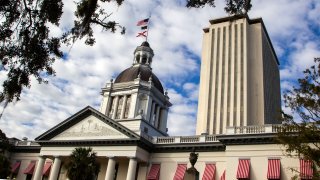
With just two weeks left before their scheduled adjournment, both chambers of the Republican-controlled Legislature are inching closer to a budget deal as they continue to work on a slate of bills central to the governor's legislative agenda.
In the coming week, lawmakers are contending with a contentious proposal that would rewrite rules on voting by mail, including imposing stricter ID requirements for changing voter registration information and submitting completed ballots.
Also still awaiting action is a slate of bills focused on the power of Big Tech — in how it controls the information on social media platforms and in how it collects and uses consumer data.
Delivering a balanced budget is the only mandate lawmakers have during their two month session. But the Legislature has already handed Gov. Ron DeSantis major victories he can tout in his re-election bid — which he is expected to announce soon after the Legislature gavels to a close at the end of the month.
Get South Florida local news, weather forecasts and entertainment stories to your inbox. Sign up for NBC South Florida newsletters.
DeSantis has already signed into law a measure that protects most businesses, including health care providers, from most lawsuits seeking redress from their handling of the COVID-19 outbreak. He is also expected to soon sign into law a bill that would increase the penalties against violent protesters.
Spending has always been a key concern among lawmakers, but even more so this session because of the economic downturn caused by the shuttering of vast sectors of the economy in the early months of the pandemic. An infusion of cash from the federal government, including an estimated $10 billion share from the latest pandemic relief package, has eased some of the sting but lawmakers continue to discuss how that money will be allocated.
The House has included some of that money in its $97 billion budget proposal, while the Senate has excluded it under a $95 billion spending plan it approved earlier this month. The governor has also proposed adding more than $4.1 billion to $96.6 billion budget he proposed before lawmakers gaveled into session.
Local
Meanwhile, lawmakers are continuing to deal with pushback from companies concerned about proposals that would limit how they collect and use consumer data.
The House could take up the consumer privacy proposal when it holds its next floor session on Tuesday. The measure now more closely aligns with a version in the Senate, which dropped a provision would have allowed individual consumers to sue. It did so under pressure from business lobbyists.
Despite the changes, lobbyists for business interests continue to oppose the privacy measure, which would give consumers some level of transparency in how companies collect and use the data they harvest from day-to-day transactions and activities.
During its Tuesday session, the House is also also expected to take up a proposal targeting social media companies. Spurred by the governor, legislative Republicans are considering measures that would impose new rules on how companies, including Facebook and Twitter, post information on their social media platforms. It would also prohibit those companies from suspending accounts of office seekers.
A Senate committee is expected to put finishing touches on a nationally watched elections bill that would rewrite rules on voting by mail, as well as put new requirements on routine election-related transactions.
While the Senate has dropped a proposal that would have banned vote-by-mail drop boxes, Democrats and voter rights advocates continue to be concerned because of new ID requirements they say will make it more inconvenient to vote.



